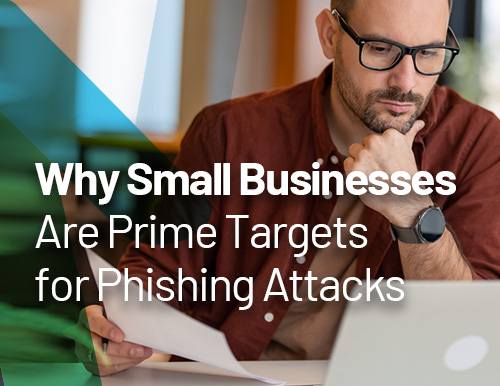In today's digital landscape, where online transactions and communications play a pivotal role in the operations of businesses of all sizes, security threats are more prevalent than ever. Among these threats, phishing attacks have emerged as a top concern. While one might assume that cybercriminals exclusively target large corporations with deeper pockets, the reality is starkly different. Small businesses, often overlooked in the grand scheme of cybersecurity, are becoming increasingly attractive targets. Here’s why: 1. Perceived Lower Security Defences Small businesses often operate with limited IT resources. This might lead to outdated security software, a lack of encryption, or even the absence of basic security protocols. Cybercriminals are well-aware of these vulnerabilities and view smaller enterprises as low-hanging fruit, with easier access points for data breaches. 2. Lack of Employee Training Cybersecurity awareness training is crucial for recognising and thwarting phishing attempts. Larger corporations often invest more in educating their employees about potential threats. Small businesses, on the other hand, may not have the budget or perceive the necessity for such training, making their teams more susceptible to sophisticated phishing schemes. 3. Valuable Data, Regardless of Size Every business, irrespective of its size, holds valuable data. This can range from customer credit card details to supplier contracts or company financials. For a cybercriminal, this data is a goldmine, offering numerous opportunities for exploitation, be it identity theft, financial fraud, or even competitive sabotage. 4. Lesser Scrutiny and Monitoring Many small businesses may not have dedicated IT personnel monitoring network traffic and email communications for suspicious activity. This means that a phishing email has a higher likelihood of slipping through the cracks, going unnoticed until the damage is already done. 5. Reputation Leverage Hacktivists can compromise a small business's email to launch more attacks, especially if the business has a good reputation with its partners and customers. Using the trusted identity of a compromised small business, cybercriminals can easily target more victims, spreading their nefarious net even further. Mitigating the Risks Understanding the reasons why they are targeted can help small businesses take proactive steps to defend against phishing threats. Here are a few quick tips:
- Invest in Security: Even on a budget, there are affordable security tools and services tailored for small businesses.
- Employee Training: Regularly security awareness to educate your team about the latest phishing techniques and how to spot them.
- Regular Backups: Ensure business data is regularly backed up to prevent significant loss in case of a breach.
- Two-Factor Authentication: Implement this added layer of security to protect against unauthorised email access.
Conclusion In the evolving world of cybersecurity threats, no business is too small to be a target. Recognising vulnerabilities and taking pre-emptive action is the key to safeguarding your business, ensuring that while your business might be small, its defences are mighty.



